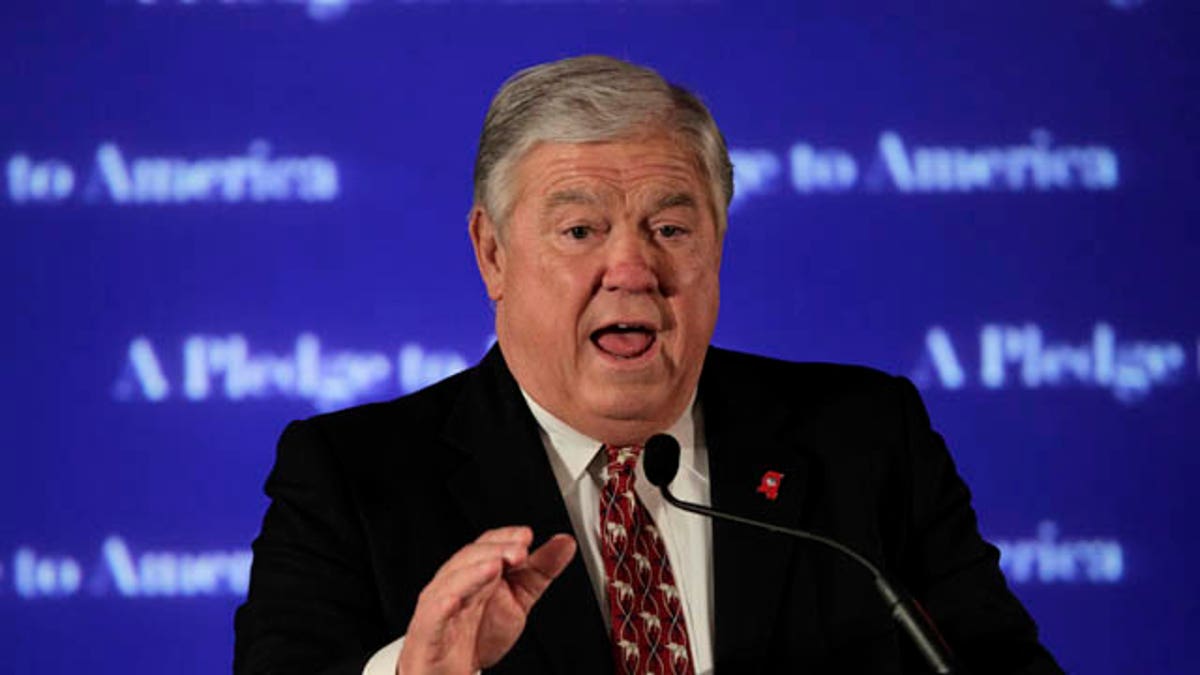
FILE: Mississippi Gov. Haley Barbour, chairman of the Republican Governors Association, speaks at an Election Night gathering hosted by the National Republican Congressional Committee at the Grand Hyatt hotel in Washington. (AP)
Few Republicans have proven themselves better at getting things done than Mississippi Gov. Haley Barbour, who shepherded his state through Hurricane Katrina five years ago, rid it of a $720 million deficit without raising taxes and runs it this fiscal year on less money than it took two years ago.
It's a success rate that not only CEOs aspire to in their own companies, but the chief executive officer of the United States is expected to achieve for the nation -- and one reason why many conservatives say Barbour is a real contender for promotion to the White House.
“When I was elected governor, I ran on an agenda, and I followed that agenda,” Barbour told Fox News. “Everybody knew that I feel that raising taxes is the enemy of controling spending.”
The state of Mississippi will spend 13 percent less this fiscal year than two years ago. It’s a lesson Barbour says the federal government needs to learn.
"You can't do it overnight," Barbour said of putting restraints on runaway spending.
But, he said, one surefire way to hurt revenue, particularly when the government is so bound by entitlement spending, is to raise taxes.
"We've seen this in the past. Revenue will literally go down with higher tax rates in a recession," he said.
As for foreign policy, Barbour, the former chairman of the Republican National Committee and one-time campaign aide to Richard Nixon, said exhibiting global strength remains the United States’ best way to exert influence.
“What we've gone out and done is lessened -- weakened our friendships and made the people who don't like us less afraid of us. I think that's a very serious issue because that ties into nuclear Iran, that ties into nuclear North Korea, that ties into a very, much more belligerent Russia. America's standing in the world has gone down both among our friends and among our competitors and adversaries,” he said.
While the economy and foreign policy are top issues in any presidential election, the last decade has shown that Americans also want someone in the White House that they believe will be able to handle the unexpected.
Barbour earned that reputation when Hurricane Katrina hit. While officials in Louisiana and Washington were slammed by accusations of disorganization and incompetence, Barbour is still praised for his performance during the crisis. He said the best lesson he learned is preparedness.
“If you have the biggest natural disaster in American history, having a good plan helps but anybody that thinks everything's going to go right just doesn't know what he's talking about,” he said.
While Barbour may be best recognized for his handling of the aftermath of Hurricane Katrina five years ago, he is best known in Washington for his inside-the-beltway dealings.
In the 1980s he was President Reagan’s director of political affairs. After two successful terms at the helm of the RNC – notably during the Republican revolution of 1994 – he became a noted K Street lobbyist.
That insider status could be a disadvantage in 2012, said Larry Sabato, director of the University of Virginia’s Center for Politics.
“Given the American public's view of lobbyists, it is difficult to imagine that he would be elected with that qualification,” Sabato said.
But Barbour said the connotation of a lobbyist depends on one’s perspective.
"Washington insider, to some people, means corrupt or bad. For other people, it means knows how to get things done -- can get the ball in the end zone," he said.
Already, Barbour may be looking downfield. He sent a mailer to Republicans in Iowa, home to the nation’s first presidential caucus. It said, "Haley knows what it takes to succeed."
Could that mean he’s laying the groundwork for 2012?
“What the mailer was for, and it went to several states, was to raise money for my PAC, so that I can put money back in to elect more Republican governors,” he said.
That PAC has been generous. As chairman of the Republican Governors Association, Barbour appeared in several contests this year, including in Florida, Iowa and New Hampshire, home to the first primary. All three are key states to choosing President Obama’s opponent in 2012.
“Obama and the Democratic Congress have run as far to the left, faster than any other administration and Congress in American history, and the American people don't like those policies,” he said, noting that governors historically have a good track record of getting elected to run the country.
Watch “Special Report With Bret Baier” at 6 p.m.. ET weekdays through Nov. 19 for the series “12 in 2012” -- profiles of potential GOP contenders for the White House.




